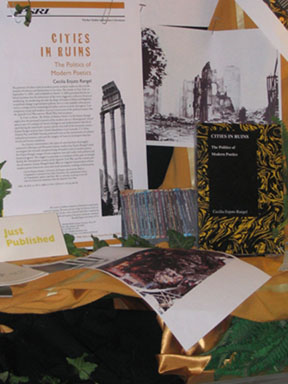Cities in Ruins: The Politics of Modern Poetics
Cecilia Enjuto Rangel
The presence of urban ruins in modern poetry awakens readers to the real-life remains of violence and destruction in our cities. The attacks in New York on September 11, 2001, and in Madrid on March 11, 2004, provoked diverse political reactions, but the imminence of the ruins triggered a collective historical awakening. An awakening can take the shape of bombs in Kabul and Baghdad, or political change in government policies, but it is also palpable when poetry voices a critique of the technological warfare and its versions of progress. Contemporary events and modern ruins are reminiscent of the political impact that the Spanish Civil War and two World Wars had on poetry.
In Cities in Ruins: The Politics of Modern Poetics, Cecilia Enjuto Rangel argues that the portrayal in poetry of the modern city as a disintegrated, ruined space is part of a critique of visions of progress and modernization that developed during the nineteenth century and the first half of the twentieth century. Enjuto Rangel analyzes how Charles Baudelaire, Luis Cernuda, T. S. Eliot, Octavio Paz, and Pablo Neruda poeticized ruins as the cornerstones of cultural and political memory, and used the imagery of ruins to reinterpret their historical and literary traditions.
As a literary commonplace, the topos of ruins has been thoroughly examined in Baroque and Romantic literary studies, but Enjuto Rangel’s study investigates the virtually unexplored map of modern ruins in modern poetry. For Enjuto Rangel, images of ruin empower text and reader with political and historical agency. This triggers a conscious re-evaluation of the past, as exemplified by the Transatlantic poetics of the Spanish Civil War and the current politics of memory. Enjuto Rangel’s book offers an original interpretation of how modern poems historicize ruins and avoid narcissistic readings of destruction.
"This work is a brilliant composite of Modernity’s major poetic quests for meaning. The notion of ruins brings the literary, historical, and political issues to the fore with a scholarly depth that is matched by the breadth and urgency of the poetic statements examined." —Ronald Puppo, University of Vic
“Major European and American poets and discourses on ruins are studied in the light of recent historical world events which share a common thread of conflict and crisis. The poetry selected for study, which forms part of the Western literary tradition, conceptualizes the crisis of perception of our age, symbolized by the topos of ruins.” —L. López Fernández, Bulletin of Spanish Studies 89.3 (2012): 471–72
“…Cities in Ruins offers a passionate mapping of poetry’s struggles to grapple with a political present through forms inherited from the past, turning the ‘breathlessness of a collage of temporal paradoxes’ into a critical force (125).”—Michelle Clayton, Revista de Estudios Hispánicos 47.1 (Mar. 2013): 185-87
"The questions Cecilia Enjuto-Rangel raises in this thought-provoking and elegantly written book transcend the five poets who are her primary focus … . She uses the poetic motif of ruination as jumping-off point for reflections on such broader concerns as the relationship of modern poetry to history and political commitment and the configuration of the scholarly fields from which we read and analyze poetic texts." —Sebastiaan Faber, Comparative Literature 65.4 (Fall 2013): 491-93.
For more reviews of Enjuto Rangel's work, see
Reference and Research Book News, Feb. 2011.
Cecilia Enjuto Rangel, University of Oregon, received her PhD in Comparative Literature from Yale University. Her publications focus on Transatlantic poetics and film. She is currently working on an edition of a historical testimony from the Spanish Civil War.
ISBN-13: 978-1-55753-571-9
2010. Vol. 50. xii, 363 pp. Paper $45.00

Window in Stanley Coulter Hall November 17-24, 2010.
Images @ Jupiterimages 2010 and Wikipedia.
Information last updated September 18, 2015.
For further information about this book, contact the production editor at clawsons@purdue.edu